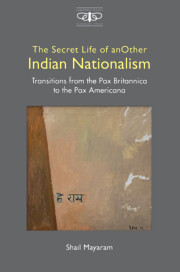 The Secret Life of Another Indian Nationalism
The Secret Life of Another Indian Nationalism Published online by Cambridge University Press: 11 February 2022
Three Moments
An epic encounter took place with a meeting between Vinayak Damodar Savarkar and Mohandas Karamchand Gandhi in 1909. The students of Savarkar (1883–1966) had invited Gandhi for a discussion of the Ramayana on the occasion of Dashehra, the festival commemorating Rama's victory over Ravana. Each interpreted the figure of Rama differently. For Gandhi Rama represented ethical sacrifice, for Savarkar Rama epitomised the warrior ethic; Rama would violently eliminate evil for the cause of the nation.
The meaning of this epic encounter has to do with the transformation of the political for over a century and has continued to unravel to date as India grapples with hyper-nationalism that harbours a range of approaches from being majoritarian to being viciously anti-minority. Gandhi undertook one of the great experiments in the possibility of an ethical nationalism, one which could strive to be non-violent and other-oriented, its foundations being truth and inner transformation. Even Huseyn Shaheed Suhrawardy (1892–1963), who publicly acknowledged his responsibility for the Great Calcutta Killings of 1946, would be transformed by Gandhi's practice. Indeed, the killers of Gandhi had also intended the assassination of Jawaharlal Nehru (1889–1964) and Suhrawardy. The only such grand attempt at non-violence preceding Gandhi's was that of Emperor Ashoka (r. 268–232 BCE), who renounced war even though he had achieved victory on the battlefield.
In Gandhi's assassination in 1948 two kinds of nationalism confronted each other directly. Savarkar saw Gandhi as destroying any possibility of a grand future vision for an ancient civilisation. He saw non-violence as something that would weaken rather than empower India, and articulated a nationalism based on exclusion. His Essentials of Hindutva became a foundational text for the ideology that is often called political Hinduism or Hindu nationalism but is best referred to as Hindutva. Gandhi had hoped to transform his interlocutor and had gone to meet him after his release from the Cellular Jail. Savarkar remained unmoved.
The story of Indian nationalism is variously told and most often associated with the freedom struggle. Ashis Nandy relates it to the publication of Rabindranath Tagore's Gora in 1910, a novel in Bengali that according to him brought together two selves that augured Gandhi and Savarkar in the protagonist Gora.
To save this book to your Kindle, first ensure [email protected] is added to your Approved Personal Document E-mail List under your Personal Document Settings on the Manage Your Content and Devices page of your Amazon account. Then enter the ‘name’ part of your Kindle email address below. Find out more about saving to your Kindle.
Note you can select to save to either the @free.kindle.com or @kindle.com variations. ‘@free.kindle.com’ emails are free but can only be saved to your device when it is connected to wi-fi. ‘@kindle.com’ emails can be delivered even when you are not connected to wi-fi, but note that service fees apply.
Find out more about the Kindle Personal Document Service.
To save content items to your account, please confirm that you agree to abide by our usage policies. If this is the first time you use this feature, you will be asked to authorise Cambridge Core to connect with your account. Find out more about saving content to Dropbox.
To save content items to your account, please confirm that you agree to abide by our usage policies. If this is the first time you use this feature, you will be asked to authorise Cambridge Core to connect with your account. Find out more about saving content to Google Drive.